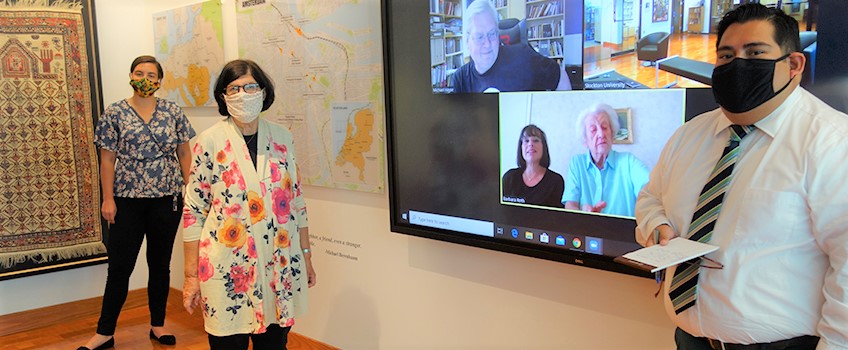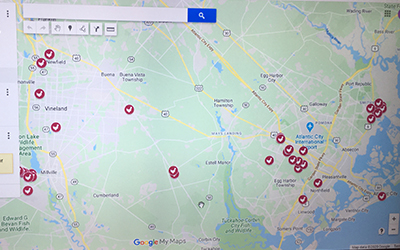Holocaust Center Creating New Digital Archive

Holocaust Center Executive Director Gail Rosenthal (In floral jacket) with staff members Morgan Everman and Irvin Rodriguez-Moreno, do a Zoom interview with Associate Professor of History Michael Hayse and Holocaust survivor Elizabeth Roth from Vineland and her daughter-in-law Barbara Roth, whose parents were also survivors.
Galloway, N.J. _ The Sara and Sam Schoffer Holocaust Resource Center at Stockton University is looking for area Holocaust survivors and their family members for a major new project to compile and create a digital archive on the lives of Holocaust survivors who settled in South Jersey.
The “South Jersey Holocaust Survivor Digital Archive and Exhibition” will focus on survivors from Atlantic, Cape May, and Cumberland counties. Stockton faculty, staff and students are identifying and interviewing survivors and/or their family members, and reviewing memoirs written by survivors through the center’s Memoir Project.
Some 250 area survivors have already been identified, and about 20 have been interviewed through Zoom since the spring, said Gail Rosenthal, executive director of the Holocaust Center.
“It is essential that we collect the documents and testimonies now,” said Associate Professor of History Michael Hayse, who is curating the project. “The number of Holocaust Survivors who are still with us is quickly dwindling. Several local Holocaust survivors have passed away since we started the project seven months ago.”
The archive and exhibition will be an enduring resource for students and the public to learn about the history of the Holocaust and Jewish life in Europe before World War II. One often overlooked matter aspect of this history concerns the months and years many survivors spend as refugees, or in the parlance of the time, “Displaced Persons,” (DPs) after World War II. The project will also focus on several topics that are of special interest to our region:
- Immigration to the United States. Many Holocaust survivors first lived and worked in major metropolitan areas, especially New York City, before coming to South Jersey. The exhibition will explore how they navigated the transition to a new country, a new language, and new customs.
 The Jewish Chicken Farms of South Jersey. A large number of local survivors first came to the region because of the opportunity
to own and operate chicken farms. By the mid-1950s, there were dozens of egg and poultry
farms in South Jersey owned by Jewish survivors of the Holocaust, with large clusters
of farms in Millville, Oceanville, Egg Harbor Township, and Vineland. The work on
the chicken farms was hard, and the financial reward was limited. Changes to the egg
and poultry industry forced most small family-owned poultry farms in the United States
out of business by the mid-1960s, including the Jewish farms of South Jersey.
The Jewish Chicken Farms of South Jersey. A large number of local survivors first came to the region because of the opportunity
to own and operate chicken farms. By the mid-1950s, there were dozens of egg and poultry
farms in South Jersey owned by Jewish survivors of the Holocaust, with large clusters
of farms in Millville, Oceanville, Egg Harbor Township, and Vineland. The work on
the chicken farms was hard, and the financial reward was limited. Changes to the egg
and poultry industry forced most small family-owned poultry farms in the United States
out of business by the mid-1960s, including the Jewish farms of South Jersey.
A special traveling exhibition on the “The Jewish Chicken Farms of South Jersey,” is being created by Allison Kisielis, a graduate student in the Master of Arts in Holocaust and Genocide Studies program. It is scheduled to debut in Summer 2021 and will also go to schools, historical societies, libraries, and other sites in South Jersey.
- Contributions to Southern New Jersey. Holocaust survivors and their families became pillars of the region’s economy, culture, and society. As they moved off the chicken farms, many bought or established businesses in the hospitality industry, real estate, retail, commercial fishing, and other fields. Because they invested in their children’s education the Second Generation and beyond have further expanded businesses, and have gone on to other careers in law, medicine, education, and much more. The Exhibition will highlight these individual stories.
Hayse said computer stations in the Holocaust Center will allow students and visitors to learn about the Holocaust through the eyes of survivors. Some information will also be available online.
Rosenthal said the completed interviews have led to identifying more survivors and their families.
She said students and student interns will be actively involved in creating the project and one major project is creating an interactive map of all of the Jewish-owned chicken farms for the exhibition.
The center sent letters out in the spring inviting area survivors or their family members to participate, but Rosenthal said she knows there are more who have yet to be identified.
“People we talk to keep leading us to more people,” she said. “We want to tell their stories, to show how they survived, kept going, and contributed to life in South Jersey.”
Leo Schoffer, a member of the executive committee of the Holocaust Center, and the son of Holocaust survivors for whom the center is named, said the new project will complete the connection between the center and the community that was central to its development.
“South Jersey offered an opportunity for survivors to settle here and begin a new life after they were evicted from their ancestral homes,” Schoffer said. “It is a very special story. The center is preserving their names and histories so future generations can better understand who they were, why they came here, and their connections to the community.”
Anyone with information can contact Rosenthal at the Holocaust Center at 609 652-4699 or at gail.rosenthal@stockton.edu.
# # #
Contact:
Diane D’Amico
Director of News and Media Relations
Galloway, N.J. 08205
Diane.D’Amico@stockton.edu
609-652-4593
609-412-8069
stockton.edu/media


